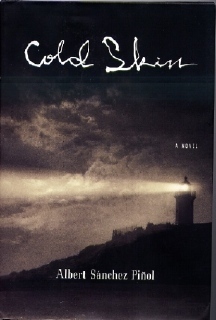Cold Skin
Translated by Cheryl Leah Morgan
Farrar, Straus and Giroux
US Hardcover First Edition
ISBN 0-374-18239-6
Publication Date: 11-02-2005
182 Pages; $20.00
Date Reviewed: 04-03-06
Reviewed by: Rick Kleffel © 2006

REFERENCES
COLUMNS
|
|
|
Cold SkinTranslated by Cheryl Leah Morgan Farrar, Straus and GirouxUS Hardcover First EditionISBN 0-374-18239-6Publication Date: 11-02-2005182 Pages; $20.00Date Reviewed: 04-03-06Reviewed by: Rick Kleffel © 2006 |
 |
|
REFERENCES |
COLUMNS |
|
|
It's amazing how common monsters are, considering we've never really seen one.
Yet, we're surrounded by fiends, assaulted by creatures, besieged by those who are simply other -- every time we look in the mirror. We give ourselves the creeps. We are the creeps, the crawlers, and the cannibals. Humans are the most perfectly designed monsters around, because, we are around. We're surrounded by our own heinous kind. Need I mention that we're at the top of the food pyramid? That means you only need to consume a little bit of human flesh every day to get your minimum daily requirement.
'Cold Skin' by Albert Sánchez Piñol might be titled 'Monster Island', but while descriptive, that title is also reductive, and Piñol's novel comes pre-shrunk. Piñol has boiled down his treatise on our own monstrosity into the starkest terms possible. That he's also managed to provide a plot for our predicament is proof that the monsters do exist. Don't approach 'Cold Skin' expecting a work that reads either like genre fiction or literature. Piñol has managed to venture out into literary no-man's-land. Monster territory. Neither fish nor fowl, 'Cold Skin' is what it is, nothing more and certainly nothing less. It's the monster in the mirror.
But unlike the usual "We're the enemy" piece of literary fiction, 'Cold Skin' offers readers more than an existential vacuum. As the novel starts, the unnamed narrator is dropped off on a remote Antarctic island. He's there to replace the weather official, and his job will be to take measurements for the next lonely year. But though the man he's supposed to replace is nowhere to be found, our narrator learns upon landing that he's certainly not alone. Gruner, a big oafish bear of a man, has holed up in the lighthouse. He seems certifiable from their first meeting. When night falls, our narrator learns why. Amphibious humanoid monsters emerge from the ocean and attack. He joins Gruner, only to find that Gruner has turned one of the creatures into a slave, and something more. As the attacks grow more relentless, complications ensue.
'Cold Skin' has a sort of timeless feeling that lends it a literary significance. Piñol's prose as translated by Cheryl Leah Morgan is utterly transparent and only occasionally clunky. The narrator focuses on the details of getting by each day on the island, and this rapidly becomes a tale of two men under siege by monsters. Everything is stripped away except for the rocky shoals of existence. Within the prose, Piñol packs the novel with wonderfully hard-hitting writing. Not a page goes by that doesn't present the reader with a sentence to treasure. 'Cold Skin' is a pleasure to read. But perhaps not to experience.
With only two characters, one of them nameless, Piñol makes the most of the setting, which becomes a third character. Then, of course...there are the monsters, and the one in particular that Gruner keeps. As Piñol reveals more and more about them, they rapidly come to have more texture, more details than the humans. As to the humans, well, as we get to know the monsters better, the narrator and Gruner start to seem more and more unpleasant. It's not long before they cross the line from unpleasant into repugnant. And as they become ever more skilled at killing the monsters, the reader begins to wonder where, exactly their sympathies are to lie. Are we alone in this hateful, hate-filled world?
That's a good question, but you'd better not ask Piñol if you’d like to get an answer that doesn't render what you see in the mirror considerably less appealing. Piñol does a pretty good job of straddling the line between an adventure story and an existential fable. Occasionally, he seems to lose track of the more gripping threads that bind this work, and the story starts to seem a bit repetitive. But the rewards here as the plot unfolds are considerable and message is timely. If the mirror effect is unsettling, then it is clearly intended to be so. But beyond the mirror, the monsters demonstrate a lot more depth than readers might first expect, so that the revelation of their character becomes a potent plot point. And Piñol does know how to twist the plot and the knife effectively.
Ultimately, 'Cold Skin' comes down on the Kafkaesque fable side of the literary equation, but only just barely. Piñol reveals a clever take on the science fictional conception of the other, and never forgets that he's got a built-in gripping premise. Man versus monster, it doesn't get much simpler or more exciting than that. 'Cold Skin' is likely to induce the feeling it describes but not for reasons you might expect. Slick, slim and deadly, 'Cold Skin' is perfect reading for those who like monsters - or suspect that they may be monsters.